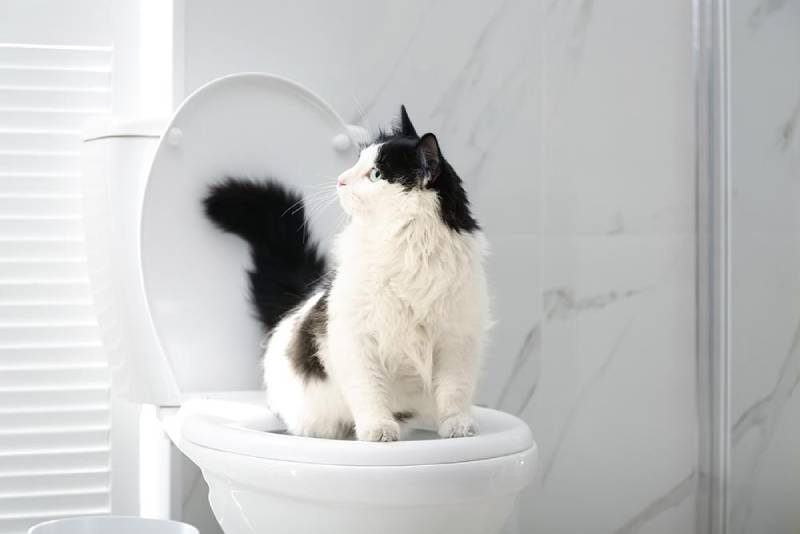Reasons Flushing Cat Poop Down Your Toilet Can Cause Problems - Tips for Proper Handling
Reasons Flushing Cat Poop Down Your Toilet Can Cause Problems - Tips for Proper Handling
Blog Article
In this article down the page you can find a bunch of brilliant information and facts pertaining to Can You Flush Cat Poo or Litter Down the Toilet?.

Intro
As pet cat owners, it's essential to bear in mind how we deal with our feline buddies' waste. While it might seem convenient to purge feline poop down the commode, this technique can have detrimental effects for both the atmosphere and human health.
Alternatives to Flushing
Fortunately, there are much safer and much more liable ways to dispose of pet cat poop. Consider the adhering to alternatives:
1. Scoop and Dispose in Trash
The most common technique of dealing with feline poop is to scoop it into a naturally degradable bag and toss it in the trash. Make sure to utilize a devoted trash scoop and dispose of the waste immediately.
2. Usage Biodegradable Litter
Select eco-friendly pet cat litter made from products such as corn or wheat. These clutters are eco-friendly and can be securely gotten rid of in the trash.
3. Bury in the Yard
If you have a yard, think about hiding pet cat waste in a marked area away from vegetable gardens and water sources. Make sure to dig deep enough to stop contamination of groundwater.
4. Mount a Pet Waste Disposal System
Invest in a pet dog garbage disposal system especially made for cat waste. These systems utilize enzymes to break down the waste, reducing odor and environmental impact.
Wellness Risks
In addition to environmental concerns, flushing cat waste can also present health risks to humans. Feline feces might include Toxoplasma gondii, a bloodsucker that can cause toxoplasmosis-- a potentially extreme disease, specifically for expectant ladies and people with weakened body immune systems.
Environmental Impact
Purging pet cat poop presents damaging virus and parasites into the supply of water, presenting a substantial threat to marine ecological communities. These impurities can adversely affect aquatic life and concession water top quality.
Conclusion
Liable animal ownership extends past supplying food and shelter-- it also involves proper waste management. By refraining from flushing pet cat poop down the bathroom and opting for alternative disposal approaches, we can decrease our ecological footprint and protect human health.
Why Can’t I Flush Cat Poop?
It Spreads a Parasite
Cats are frequently infected with a parasite called toxoplasma gondii. The parasite causes an infection called toxoplasmosis. It is usually harmless to cats. The parasite only uses cat poop as a host for its eggs. Otherwise, the cat’s immune system usually keeps the infection at low enough levels to maintain its own health. But it does not stop the develop of eggs. These eggs are tiny and surprisingly tough. They may survive for a year before they begin to grow. But that’s the problem.
Our wastewater system is not designed to deal with toxoplasmosis eggs. Instead, most eggs will flush from your toilet into sewers and wastewater management plants. After the sewage is treated for many other harmful things in it, it is typically released into local rivers, lakes, or oceans. Here, the toxoplasmosis eggs can find new hosts, including starfish, crabs, otters, and many other wildlife. For many, this is a significant risk to their health. Toxoplasmosis can also end up infecting water sources that are important for agriculture, which means our deer, pigs, and sheep can get infected too.
Is There Risk to Humans?
There can be a risk to human life from flushing cat poop down the toilet. If you do so, the parasites from your cat’s poop can end up in shellfish, game animals, or livestock. If this meat is then served raw or undercooked, the people who eat it can get sick.
In fact, according to the CDC, 40 million people in the United States are infected with toxoplasma gondii. They get it from exposure to infected seafood, or from some kind of cat poop contamination, like drinking from a stream that is contaminated or touching anything that has come into contact with cat poop. That includes just cleaning a cat litter box.
Most people who get infected with these parasites will not develop any symptoms. However, for pregnant women or for those with compromised immune systems, the parasite can cause severe health problems.
How to Handle Cat Poop
The best way to handle cat poop is actually to clean the box more often. The eggs that the parasite sheds will not become active until one to five days after the cat poops. That means that if you clean daily, you’re much less likely to come into direct contact with infectious eggs.
That said, always dispose of cat poop in the garbage and not down the toilet. Wash your hands before and after you clean the litter box, and bring the bag of poop right outside to your garbage bins.
https://trenchlesssolutionsusa.com/why-cant-i-flush-cat-poop/

I recently found that blog post about Don’t flush cat feces down the toilet when doing a lookup on the internet. Liked our blog entry? Please share it. Let someone else check it out. Thanks a lot for your time invested reading it.
Book A Service Report this page